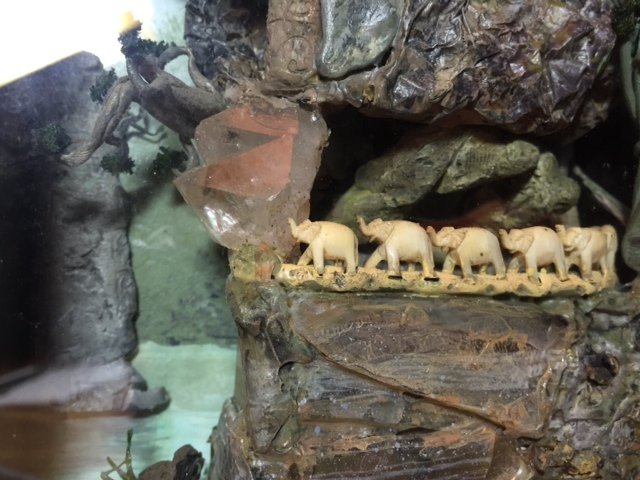With the twilight sky fading outside the driver's-side window of his gleaming watermelon, Arlo had lots to think about on the way back to Hill Valley.
Mr. Hoover
The Mayor of Lakeland is a cat named Mr. Hoover. Residing in the Town Hall building, the plump Mr. Hoover naps among the official relics and occasionally wakes up to bellow, demanding food and audience. While it's agreed throughout Lakeland that Mr. Hoover is not a necessarily a well-liked cat, he is, nonetheless, always re-elected by a landslide.
Aside from official duties of eating and making messes in the various novel ways that cats all specialize in, Mr. Hoover does nothing. All he asks; that the town will feed him- that his voice be heard, preferably in a warm dry place with snacks, and that the food bowls will be KEPT filled by the town so that some normalcy can be sustained. He promises that, if fed now, he will take full responsibility for any mistakes or messes that may have been made in the past.
Arlo laughed at the idea of a cat for mayor as an actual thing. "Lakeland gets it."
Fiction Vs Reality
Arlo thought about the startling contrast between the Lakeland and Hill Valley, and marveled at the ways that the people of Hill Valley could still be persuaded to delegate their creative powers to an imaginary authority. The border separating the two towns was a testament to this misapplied creativity. It's only real purpose was to perpetuate the divisive mindset that kept the two cultures from being one. The subjects of a working Fictionarium were simply sold the building material known as 'patriotism' to make the division seem necessary.
A typical Fictionarium society, with the help of a few well-placed surveillance monitors- the presumption of an all-seeing eye- will police themselves with more oppression than any actual trained police force could hope to do with their intimidating uniforms or nightsticks. But in the Fictionarium, even the surveillance cameras are fictional; designed to appear real, but hollow inside. Endless mind games.
The subjects will remain busy meanwhile, programmed for the mundane- they will work hard so that they can buy a car to get to work and spend their days working to pay for a house that they only see at night. The children are then taught that this is the way to be a smart, responsible person.

It had always been understood that the subjects had volunteered for the experiment, and it was presumed that these subjects knew what the premise of the experiment was: they were to start a new society in a ready-made town, and at some point the SB would evaluate the experiment to study which elements led to progress, and what factors could lead to the fledgling society's demise. All in the name of science, it was understood.
Most of the participants didn't realize that they themselves were the force which ultimately dictated the direction of the project- they instead would lazily delegate the power back to the SB and it's directors, feeling secure in the idea that they would be saved by the mighty hand of Science if things ever became too uncomfortable for them.
Harnessing a Society's Imagination
Glumly tapping their feet to the rhythm of the pistons in their great machine, the subjects of the Fictionarium experiment remained unaware that they had absolutely been the composers of their oppressive tune, and that their tapping toes were the very source of the beat.
Laziness is what it was, or collective immaturity. They were trained from birth to shun responsibility, and just as a child depends on it's parents to know which artwork goes where on the refrigerator door, a Fictionarium's society depended on the City to take care of adult issues while they slept. This was a handy mechanism for children of all ages: to always blame the grown-ups for any problems, and to always assume that someone else held all of the authority.
With their inhumane study of humanity, the Science Board had apparently reasoned that if a society's creative forces were left untapped, that energy would be wasted on the humans who dwell within that society. The people's free time was seen as the devil's plaything. An incubator of forbidden thought, free time allowed the subjects those extra moments to notice things.

It was a gloomy world indeed, but it was Arlo's world, the one he was trained for. The Fictionarium, however, had taken on a different light for Arlo now. Thinking about the uncanny visit to Lakeland was already like a dream, even though he knew it was more real than the dystopia he was accustomed to. Until now, he had never visited a real world, and visiting reality was exactly what he had needed.
Arlo pulled into the darkening Hill Valley and bravely parked the glistening watermelon in front of his own apartment. Carrying his new anti-gravity bike inside, he tried to think which would be worse: A new threatening message from Don Felger, or no new message at all. A new message would be preferable, because it would at least allow the option to read between the lines. If there was no new message then there were no lines to read between, and only suspense and fear could thrive in such a vacuum.
-------------------
FICTIONARIUM previous chapters:
Intro
CH 1
CH2
CH2.ptII
CH3.
CH6. PART I CH6. PART II CH6. PART III CH6. PART IV
Images for this chapter are photos of a diorama which will be examined more closely in an upcoming article, follow @therealpaul to see inside it soon.
